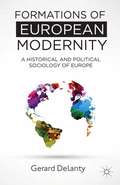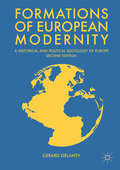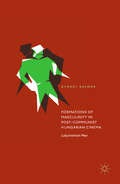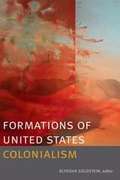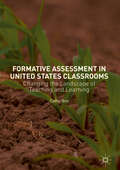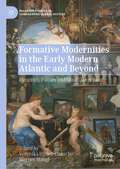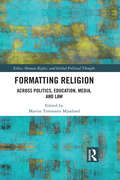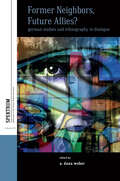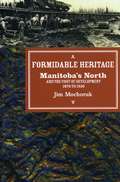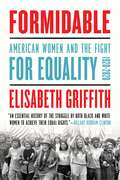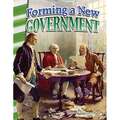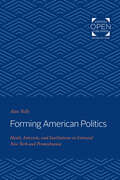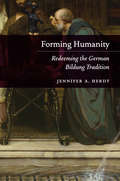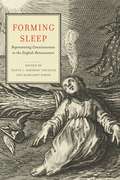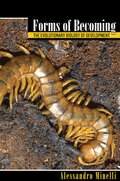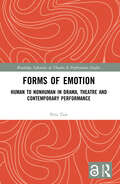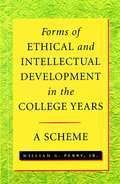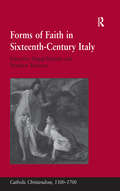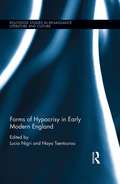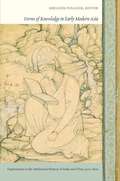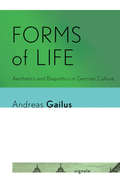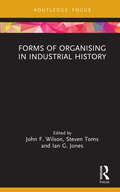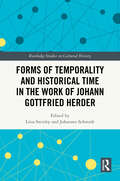- Table View
- List View
Formations of European Modernity: A Historical and Political Sociology of Europe
by G. DelantyThis book presents a historical and political sociology of European history and society. It offers a critical interpretation of the course of European history looking at the emergence of the idea of Europe and the emergence of modernity.
Formations of European Modernity: A Historical and Political Sociology of Europe
by Gerard DelantyThis book presents a historical and political sociology of European history and society. It offers a critical interpretation of the course of European history looking at the emergence of the idea of Europe and the formation of modernity. Now fully updated, Delanty's second edition features commentary on Brexit, populism, the refugee crisis, and secessionism, as well as additional coverage of colonialism and the wider global context. The book will be in an invaluable resource for advanced undergraduates and postgraduate students of historical sociology, the history of Europe, nations and modernity, political sociology, and political and social theory.
Formations of Masculinity in Post-Communist Hungarian Cinema
by György KalmárThis book investigates the formations of masculinity in Hungarian cinema after the fall of communism and explores some of the cultural phenomena of the years following the 1989 regime change. The films explored offer a unique perspective encompassing two entirely different worlds: state socialism and neoliberal capitalism. The films suggest that Eastern Europe is somehow different than its western counterpart and that its subjects are marked by what they went through before and after 1989. These films are all remembering, interpreting, picturing, marketing and trying to come to terms with this difference—with the memory and effects of state-socialism. In looking closely at the films’ male figures, one may not only get a glimpse of the dramatic changes Eastern European societies went through after the fall of communism but also see the brave new world of global neoliberal capitalism through the eyes of the Eastern European newcomers.
Formations of United States Colonialism
by Alyosha GoldsteinBridging the multiple histories and present-day iterations of U.S. settler colonialism in North America and its overseas imperialism in the Caribbean and the Pacific, the essays in this groundbreaking volume underscore the United States as a fluctuating constellation of geopolitical entities marked by overlapping and variable practices of colonization. By rethinking the intertwined experiences of Native Americans, Puerto Ricans, Chamorros, Filipinos, Hawaiians, Samoans, and others subjected to U.S. imperial rule, the contributors consider how the diversity of settler claims, territorial annexations, overseas occupations, and circuits of slavery and labor--along with their attendant forms of jurisprudence, racialization, and militarism--both facilitate and delimit the conditions of colonial dispossession. Drawing on the insights of critical indigenous and ethnic studies, postcolonial theory, critical geography, ethnography, and social history, this volume emphasizes the significance of U.S. colonialisms as a vital analytic framework for understanding how and why the United States is what it is today.Contributors. Julian Aguon, Joanne Barker, Berenika Byszewski, Jennifer Nez Denetdale, Augusto Espiritu, Alyosha Goldstein, J. K?haulani Kauanui, Barbara Krauthamer, Lorena Oropeza, Vicente L. Rafael, Dean Itsuji Saranillio, Lanny Thompson, Fa'anofo Lisaclaire Uperesa, Manu Vimalassery
Formative Assessment in United States Classrooms: Changing the Landscape of Teaching and Learning
by Cathy BoxThis book examines the history of formative assessment in the US and explores its potential for changing the landscape of teaching and learning to meet the needs of twenty-first century learners. The author uses case studies to illuminate the complexity of teaching and the externally imposed and internally constructed contextual elements that affect assessment decision-making. In this book, Box argues effectively for a renewed vision for teacher professional development that centers around the needs of students in a knowledge economy. Finally, Box offers an overview of systemic changes that are needed in order for progressive teaching and relevant learning to take place.
Formative Modernities in the Early Modern Atlantic and Beyond: Identities, Polities and Glocal Economies (Palgrave Studies in Comparative Global History)
by Werner Stangl Veronika Hyden-HanschoThis book offers a new perspective on the concept of modernity. Since its invention as a contrast to Antiquity or the Middle Ages, modernity has been tied to ideas of superiority, progress, and efficiency. As a counterpart to the Marxist “history of class struggle”, “modernization theories” have transformed modernity into an almost teleological concept of historical development. These strong connotations obstruct a clear look at other forms of modernity. The contributions of the volume will show in a comparative perspective how modernity can also be understood and analyzed as multiple responses of societies and polities to organize themselves in facing ever more complex and integrated interactions at ever larger scales.
Formatting Religion: Across Politics, Education, Media, and Law (Ethics, Human Rights and Global Political Thought)
by Marius Timmann MjaalandTo talk about religion is to talk about politics, identity, terrorism, migration, gender, and a host of other aspects of society. This volume examines and engages with larger debates around religion and proposes a new approach that moves beyond the usual binaries to analyse its role in our societies at large. Formatting Religion delves into these complexities and demonstrates the topical need for better understanding of how religion, society, culture, and law interact and are mutually influenced in periods of transition. It examines how over the last two decades, people and institutions have been grappling with the role of religion in socio-cultural and political conflicts worldwide. Drawing on a host of disciplines – including sociology, philosophy, anthropology, politics, media, law, and theology – the essays in this book analyse how religion is formatted today, and how religion continuously formats society, from above and from below. The volume will be of great interest to scholars and researchers of religious studies, politics, media and culture studies, and sociology.
Former Neighbors, Future Allies?: German Studies and Ethnography in Dialogue (Spektrum: Publications of the German Studies Association #28)
by Dana WeberGerman studies scholars from various disciplines often use and reference ethnography, yet do not often present ethnography as a core methodology and research approach. Former Neighbors, Future Allies? emphasizes how German studies engages in methods and theories of ethnography. Through a variety of topics and from multiple perspectives including literature, folklore, history, sociology, and anthropology, this volume draws attention to how ethnography bridges transdisciplinary and international research in German studies.
Formidable Heritage: Manitoba's North and the Cost of Development
by Jim MochorukCanadians have an ambivalent feeling towards the North. Although climate and geography make our northern condition apparent, Canadians often forget about the north and its problems. Nevertheless, for the generation of historians that included Lower, Creighton, and Morton, the northern rivers, lakes, forests, and plains were often seen as primary characters in the drama of nation building. W.L. Morton even went so far as to write that the ìmain task of Canadian life has been to make something of that formidable heritageî of the northern Canadian shield. For many politicians and developers, "to make something" of the North came to mean thinking of the North as an empty hinterland waiting to be exploited, and today, hydroelectric projects, mining, milling, pulp and paper, and other industries have changed much of the North beyond recognition.One of the first parts of the North to be aggressively industrialized was northern Manitoba. When all of Manitoba was given in 1670 to a group of entrepreneurs, a precedent was set that was replicated throughout the provinceís history. After the province entered confederation in 1870, provincial politicians and business leaders began to look to the northern resources as a new key to the provinceís economic development. Particularly after 1912, they saw resource development in the North as a strategy to expand the provincial economy from its agricultural base. Jim Mochoruk shows how government and business worked together to transform what had been the exclusive fur-trading preserve of the Hudsonís Bay Company into an industrial hinterland. He follows the many twisting paths established by developers and politicians as they chased their goal of economic growth, and recounts the ultimate costs of development in economic, ecological, and political terms.
Formidable: American Women and the Fight for Equality: 1920-2020
by Elisabeth Griffith&“An essential history of the struggle by both Black and white women to achieve their equal rights.&”—Hillary Rodham ClintonThe Nineteenth Amendment was an incomplete victory. Black and white women fought hard for voting rights and doubled the number of eligible voters, but the amendment did not enfranchise all women, or even protect the rights of those women who could vote. A century later, women are still grappling with how to use the vote and their political power to expand civil rights, confront racial violence, improve maternal health, advance educational and employment opportunities, and secure reproductive rights. Formidable chronicles the efforts of white and Black women to advance sometimes competing causes. Black women wanted the rights enjoyed by whites. They wanted to protect their communities from racial violence and discrimination. Theirs was not only a women&’s movement. White women wanted to be equal to white men. They sought equal legal rights, political power, safeguards for working women and immigrants, and an end to confining social structures. There were also many white women who opposed any advance for any women. In this riveting narrative, Dr. Elisabeth Griffith integrates the fight by white and Black women to achieve equality. Previously their parallel struggles for social justice have been presented separately—as white or Black topics—or covered narrowly, through only certain individuals, decades, or incidents. Formidable provides a sweeping, century-long perspective, and an expansive cast of change agents. From feminists and civil rights activists to politicians and social justice advocates, from working class women to mothers and homemakers, from radicals and conservatives to those who were offended by feminism, threatened by social change, or convinced of white supremacy, the diversity of the women&’s movement mirrors America. After that landmark victory in 1920, suffragists had a sense of optimism, declaring, &“Now we can begin!&” By 2020, a new generation knew how hard the fight for incremental change was; they would have to begin again. Both engaging and outraging, Formidable will propel readers to continue their foremothers&’ fights to achieve equality for all.
Forming A New Government (Social Studies: Informational Text Series)
by Stephanie ParisThe Primary Source Readers series will ignite students' interest in history through the use of intriguing primary sources. Students will learn about the vital period of American history following the colonies' decision to establish a new government, and covers crucial topics like the Constitution of the United States and the Bill of Rights. This nonfiction reader features purposefully leveled text to increase comprehension for different learner types. Text features include captions, a glossary, and an index to help build academic vocabulary and increase reading comprehension and literacy. This book prepares students for college and career readiness and aligns with state standards including NCSS/C3, McREL, and WIDA/TESOL.
Forming American Politics: Ideals, Interests, and Institutions in Colonial New York and Pennsylvania
by Alan TullyOriginally published in 1994. In this pathbreaking book Alan Tully offers an unprecedented comparative study of colonial political life and a rethinking of the foundations of American political culture. Tully chooses for his comparison the two colonies that arguably had the most profound impact on American political history—New York and Pennsylvania, the rich and varied colonies at the geographical and ideological center of British colonial America.Fundamental to the book is Tully's argument that out of Anglo-American influences and the cumulative character of each colonial experience, New York and Pennsylvania developed their own distinctive but complementary characteristics. In making this case Tully enters—from a new perspective—the prominent argument between the "classical republican" and "liberal" views of early American public thought. He contends that the radical Whig element of classical republicanism was far less influential than historians have believed and that the political experience of New York and Pennsylvania led to their role as innovators of liberal political concepts and discourse. In a conclusion that pursues his insights into the revolutionary and early republican years, Tully underlines a paradox in American political development: not only were the pathbreaking liberal politicians of New York and Pennsylvania the least inclined towards revolutionary fervor, but their political language and concepts—integral to an emerging liberal democratic order—were rooted in oligarchical political practice."A momentous contribution to the burgeoning literature on the middle Atlantic region, and to the vexed question of whether it constitutes a coherent cultural configuration. Tully argues persuasively that it does, and his arguments will have to be reckoned with like few that have gone before, even as he develops an array of differences between the two colonies more subtle and penetrating than any of his predecessors has ever put forth."—Michael Zuckerman, University of Pennsylvania.
Forming Humanity: Redeeming the German Bildung Tradition
by Jennifer A. HerdtNow in paperback, Forming Humanity reveals bildung, or ethical formation, as the key to post-Kantian thought. Kant’s proclamation of humankind’s emergence from “self-incurred immaturity” left his contemporaries with a puzzle: What models should we use to sculpt ourselves if we no longer look to divine grace or received authorities? Deftly uncovering the roots of this question in Rhineland mysticism, Pietist introspection, and the rise of the bildungsroman, Jennifer A. Herdt reveals bildung, or ethical formation, as the key to post-Kantian thought. This was no simple process of secularization, in which human beings took responsibility for something they had earlier left in the hands of God. Rather, theorists of bildung, from Herder through Goethe to Hegel, championed human agency in self-determination while working out the social and political implications of our creation in the image of God. While bildung was invoked to justify racism and colonialism by stigmatizing those deemed resistant to self-cultivation, it also nourished ideals of dialogical encounter and mutual recognition. Herdt reveals how the project of forming humanity lives on in our ongoing efforts to grapple with this complicated legacy.
Forming Sleep: Representing Consciousness in the English Renaissance (Cultural Inquiries in English Literature, 1400–1700 #2)
by Nancy L. Simpson-Younger Margaret SimonForming Sleep asks how biocultural and literary dynamics act together to shape conceptions of sleep states in the early modern period. Engaging with poetry, drama, and prose largely written in English between 1580 and 1670, the essays in this collection highlight period discussions about how seemingly insentient states might actually enable self-formation.Looking at literary representations of sleep through formalism, biopolitics, Marxist theory, trauma theory, and affect theory, this volume envisions sleep states as a means of defining the human condition, both literally and metaphorically. The contributors examine a range of archival sources—including texts in early modern faculty psychology, printed and manuscript medical treatises and physicians’ notes, and printed ephemera on pathological sleep—through the lenses of both classical and contemporary philosophy. Essays apply these frameworks to genres such as drama, secular lyric, prose treatise, epic, and religious verse. Taken together, these essays demonstrate how early modern depictions of sleep shape, and are shaped by, the philosophical, medical, political, and, above all, formal discourses through which they are articulated. With this in mind, the question of form merges considerations of the physical and the poetic with the spiritual and the secular, highlighting the pervasiveness of sleep states as a means by which to reflect on the human condition. In addition to the editors, the contributors to this volume include Brian Chalk, Jennifer Lewin, Cassie Miura, Benjamin Parris, Giulio Pertile, N. Amos Rothschild, Garret A. Sullivan Jr., and Timothy A. Turner.
Forming Sleep: Representing Consciousness in the English Renaissance (Cultural Inquiries in English Literature, 1400–1700)
by Nancy L. Simpson-Younger Margaret SimonForming Sleep asks how biocultural and literary dynamics act together to shape conceptions of sleep states in the early modern period. Engaging with poetry, drama, and prose largely written in English between 1580 and 1670, the essays in this collection highlight period discussions about how seemingly insentient states might actually enable self-formation.Looking at literary representations of sleep through formalism, biopolitics, Marxist theory, trauma theory, and affect theory, this volume envisions sleep states as a means of defining the human condition, both literally and metaphorically. The contributors examine a range of archival sources—including texts in early modern faculty psychology, printed and manuscript medical treatises and physicians’ notes, and printed ephemera on pathological sleep—through the lenses of both classical and contemporary philosophy. Essays apply these frameworks to genres such as drama, secular lyric, prose treatise, epic, and religious verse. Taken together, these essays demonstrate how early modern depictions of sleep shape, and are shaped by, the philosophical, medical, political, and, above all, formal discourses through which they are articulated. With this in mind, the question of form merges considerations of the physical and the poetic with the spiritual and the secular, highlighting the pervasiveness of sleep states as a means by which to reflect on the human condition. In addition to the editors, the contributors to this volume include Brian Chalk, Jennifer Lewin, Cassie Miura, Benjamin Parris, Giulio Pertile, N. Amos Rothschild, Garret A. Sullivan Jr., and Timothy A. Turner.
Forms of Becoming: The Evolutionary Biology of Development
by Alessandro MinelliWhat comes first, form or function? Trumpeted as the future of biological science, evolutionary developmental biology (or "evo-devo") answers this fundamental question by showing how evolution controls the development of organisms. In Forms of Becoming, Alessandro Minelli, a leading international figure in the field, takes an in-depth and comprehensive look at the history and key issues of evo-devo. Spirited and insightful, this book focuses on the innovative ways animal organisms evolve through competition and cooperation. Minelli provides a complete overview of conceptual developments--from the fierce nineteenth-century debates between the French biologists Geoffroy and Cuvier, who fought over questions of form versus function--to modern theories of how genes dictate body formation. The book's wide-ranging topics include expression patterns of genes, developmental bias, the role of developmental genes, and genetic determinism. Drawing from diverse examples, such as the anatomy of butterflies, giraffes, Siamese twins, and corals, Minelli extends and reformulates important concepts from development, evolution, and the interplay between the two. Presenting the accessible and cutting-edge ideas of evolutionary developmental biology, Forms of Becoming is fascinating reading for anyone interested in genetics and the animal form.
Forms of Dominance: On the Architecture and Urbanism of the Colonial Enterprise (Routledge Library Editions: Ethnoscapes)
by Nezar AlSayyadOriginally published in 1992, as part of the Ethnoscapes: Current Challenges in the Environmental Social Sciences series, reissued now with a new series introduction and new preface, Forms of Dominance: On the Architecture and Urbanism of the Colonial Enterprise examines the complex experience of colonial domination, social reaction, and physical adaptation within the built environment of regions such as Morocco, Eastern Europe, India, Guatemala and East Africa, and provides a multi-disciplinary and cross-cultural perspective on the colonial experience.
Forms of Emotion: Human to Nonhuman in Drama, Theatre and Contemporary Performance (Routledge Advances in Theatre & Performance Studies)
by Peta TaitForms of Emotion analyses how drama, theatre and contemporary performance present emotion and its human and nonhuman diversity. This book explores the emotions, emotional feelings, mood, and affect, which make up a spectrum of ‘emotion’, to illuminate theatrical knowledge and practice and reflect the distinctions and debates in philosophy, neuroscience, psychology, and other disciplines. This study asserts that specific forms of emotion are intentionally unified in drama, theatre, and performance to convey meaning, counteract separation and subversively champion emotional freedom. The book progressively shows that the dramatic and theatrical representation of the nonhuman reveals how human dominance is offset by emotional connection with birds, animals, and the natural environment. This book will be of great interest to students and researchers interested in the emotions and affect in dramatic literature, theatre studies, performance studies, psychology, and philosophy as well as artists working with emotionally expressive performance.
Forms of Ethical and Intellectual Development in the College Years: A Scheme
by William G. PerrySince its original publication in 1970, this landmark book by William Perry has remained the cornerstone of much of the student development research that followed. Using research conducted with Harvard undergraduates over a fifteen-year period, Perry derived an enduring framework for characterizing student development--a scheme so accurate that it still informs and advances investigations into student development across genders and cultures. Drawing from firsthand accounts, Perry traces a path from students' adolescence into adulthood. His nine-stage model describes the steps that move students from a simplistic, categorical view of knowledge to a more complex, contextual view of the world and of themselves. Throughout this journey of cognitive development, Perry reveals that the most significant changes occur in forms in which people perceive their world rather than in the particulars of their attitudes and concerns. He shows ultimately that the nature of intellectual development is such that we should pay as much attention to the processes we use as to the content. In a new introduction to this classic work, Lee Knefelkamp--a close colleague of Perry's and a leading expert on college student development--evaluates the book's place in the literature of higher education. Knefelkamp explains how the Perry scheme has shaped current thinking about student development and discusses the most significant research that has since evolved from Perry's groundbreaking effort. Forms of Ethical and Intellectual Development in the College Years is a work that every current and future student services professional must have in their library.
Forms of Faith in Sixteenth-Century Italy (Catholic Christendom, 1300-1700)
by Matthew TreherneThe sixteenth century was a period of tumultuous religious change in Italy as in Europe as a whole, a period when movements for both reform and counter-reform reflected and affected shifting religious sensibilities. Cinquecento culture was profoundly shaped by these religious currents, from the reform poetry of the 1530s and early 1540s, to the efforts of Tridentine theologians later in the century to renew Catholic orthodoxy across cultural life. This interdisciplinary volume offers a carefully balanced collection of essays by leading international scholars in the fields of Italian Renaissance literature, music, history and history of art, addressing the fertile question of the relationship between religious change and shifting cultural forms in sixteenth-century Italy. The contributors to this volume are throughout concerned to demonstrate how a full understanding of Cinquecento religious culture might be found as much in the details of the relationship between cultural and religious developments, as in any grand narrative of the period. The essays range from the art of Cosimo I's Florence, to the music of the Confraternities of Rome; from the private circulation of religious literature in manuscript form, to the public performances of musical laude in Florence and Tuscany; from the art of Titian and Tintoretto to the religious poetry of Vittoria Colonna and Torquato Tasso. The volume speaks of a Cinquecento in which religious culture was not always at ease with itself and the broader changes around it, but was nonetheless vibrant and plural. Taken together, this new and ground-breaking research makes a major contribution to the development of a more nuanced understanding of cultural responses to a crucial period of reform and counter-reform, both within Italy and beyond.
Forms of Hypocrisy in Early Modern England (Routledge Studies in Renaissance Literature and Culture)
by Naya Tsentourou Lucia NigriThis collection examines the widespread phenomenon of hypocrisy in literary, theological, political, and social circles in England during the years after the Reformation and up to the Restoration. Bringing together current critical work on early modern subjectivity, performance, print history, and private and public identities and space, the collection provides readers with a way into the complexity of the term, by offering an overview of different forms of hypocrisy, including educational practice, social transaction, dramatic technique, distorted worship, female deceit, print controversy, and the performance of demonic possession. Together these approaches present an interdisciplinary examination of a term whose meanings have always been assumed, yet never fully outlined, despite the proliferation of publications on aspects of hypocrisy such as self-fashioning and disguise. Questions the chapters collectively pose include: how did hypocritical discourse conceal concerns relating to social status, gender roles, religious doctrine, and print culture? How was hypocrisy manifest materially? How did different literary genres engage with hypocrisy?
Forms of Knowledge in Early Modern Asia: Explorations in the Intellectual History of India and Tibet, 1500-1800
by Sheldon PollockIn the past two decades, scholars have transformed our understanding of the interactions between India and the West since the consolidation of British power on the subcontinent around 1800. While acknowledging the merits of this scholarship, Sheldon Pollock argues that knowing how colonialism changed South Asian cultures, particularly how Western modes of thought became dominant, requires knowing what was there to be changed. Yet little is known about the history of knowledge and imagination in late precolonial South Asia, about what systematic forms of thought existed, how they worked, or who produced them. This pioneering collection of essays helps to rectify this situation by addressing the ways thinkers in India and Tibet responded to a rapidly changing world in the three centuries prior to 1800. Contributors examine new forms of communication and conceptions of power that developed across the subcontinent; changing modes of literary consciousness, practices, and institutions in north India; unprecedented engagements in comparative religion, autobiography, and ethnography in the Indo-Persian sphere; and new directions in disciplinarity, medicine, and geography in Tibet. Taken together, the essays in Forms of Knowledge in Early Modern Asia inaugurate the exploration of a particularly complex intellectual terrain, while gesturing toward distinctive forms of non-Western modernity. Contributors. Muzaffar Alam, Imre Bangha, Aditya Behl, Allison Busch, Sumit Guha, Janet Gyatso, Matthew T. Kapstein, Franoise Mallison, Sheldon Pollock, Velcheru Narayana Rao, Kurtis R. Schaeffer, Sunil Sharma, David Shulman, Sanjay Subrahmanyam, Mohamad Tavakoli-Targhi
Forms of Life: Aesthetics and Biopolitics in German Culture (Signale: Modern German Letters, Cultures, and Thought)
by Andreas GailusIn Forms of Life, Andreas Gailus argues that the neglect of aesthetics in most contemporary theories of biopolitics has resulted in an overly restricted conception of life. He insists we need a more flexible notion of life: one attuned to the interplay and conflict between its many dimensions and forms. Forms of Life develops such a notion through the meticulous study of works by Kant, Goethe, Kleist, Nietzsche, Wittgenstein, Benn, Musil, and others. Gailus shows that the modern conception of "life" as a generative, organizing force internal to living beings emerged in the last decades of the eighteenth century in biological thought. At the core of this vitalist strand of thought, Gailus maintains, lies a persistent emphasis on the dynamics of formation and deformation, and thus on an intrinsically aesthetic dimension of life. Forms of Life brings this older discourse into critical conversation with contemporary discussions of biopolitics and vitalism, while also developing a rich conception of life that highlights, rather than suppresses, its protean character. Gailus demonstrates that life unfolds in the open-ended interweaving of the myriad forms and modalities of biological, ethical, political, psychical, aesthetic, and biographical systems.
Forms of Organising in Industrial History (Routledge Focus on Industrial History)
by John F. Wilson, Steven Toms and Ian G. JonesThis shortform book presents key peer-reviewed research selected by expert series editors and contextualised by new analysis from each author on different forms of organising British industry. With contributions on the strengths and weaknesses of the holding company structure, government organisation of industry during war time, the effects of forms of organisation on innovation, and debates over the suitability of international comparisons, this volume provides an array of fascinating insights into industrial history. Of interest to business and economic historians, this shortform book also provides analysis and illustrative case-studies that will be valuable reading across the social sciences.
Forms of Temporality and Historical Time in the Work of Johann Gottfried Herder (Routledge Studies in Cultural History)
by Johannes Schmidt Liisa SteinbyThis edited collection is the first volume solely dedicated to research on Johann Gottfried Herder’s understanding of history, time, and temporalities.Although his ideas on time mark an important transition period that advanced the emergence of the modern world, scholars have rarely addressed Herder’s temporalities. In eight chapters, the volume examines and illuminates Herder’s conception of human freedom in connection with time; the importance of the concept of forces (Kräfte) for a dynamic ontology; human beings’ sensuous experience of inner and external temporality; Herder’s conception of Bildung, speculations on extra-terrestrial beings and on different perceptions of time; the mythological figure Nemesis and Herder’s view of the past and the future; the temporal dimension in Herder’s aesthetics; and Herder’s biblical studies in relationship to divine infinitude and human temporality. The volume concludes by outlining the influence of Herder’s understanding of time on following generations of thinkers.Forms of Temporality and Historical Time in the Work of Johann Gottfried Herder is ideal for scholars, graduates, and postgraduates interested in Herder’s metaphysics, epistemology, and philosophy of history, as well as any scholar concerned with eighteenth-century concepts of time and the emergence of the modern world at the beginning of the nineteenth century.
